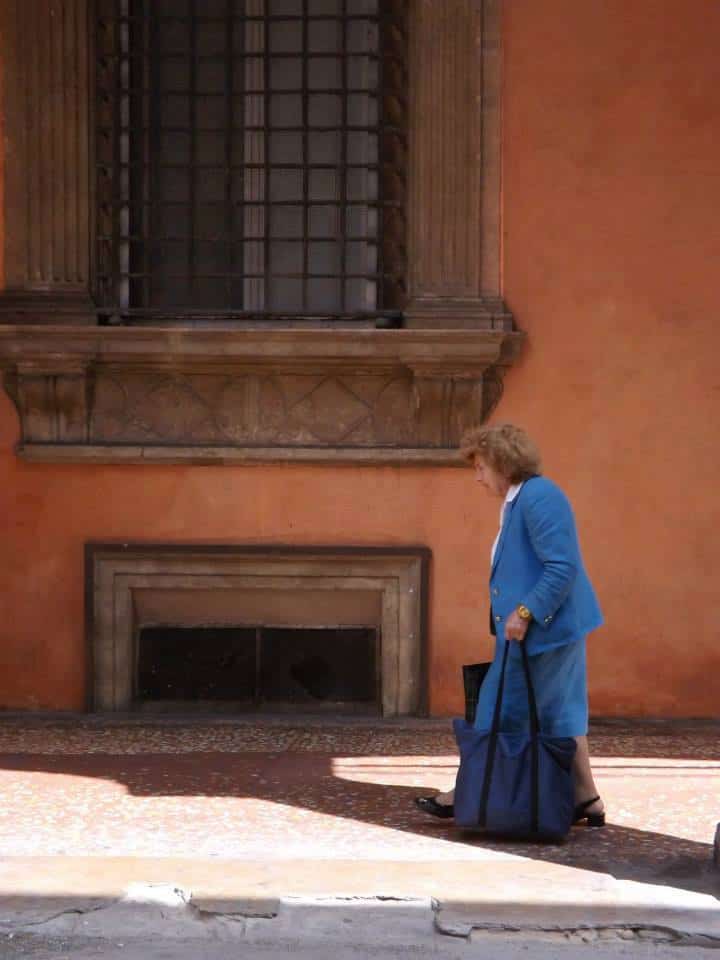How do you address someone in Italian?
Have you ever felt confused as to how to address an Italian person?
What is the difference between Signora and Signorina when you address an Italian woman? And is there a risk of offending someone by using the wrong title?
In which situations is it appropriate to use the formal or informal address?
To give you the best answer to these questions, I have interviewed three Italian women of different ages and asked them how they would feel in two hypothetical scenarios in which they are addressing someone, or being addressed by someone.
This article will give you insight into the best way to address someone in Italian. We’ll focus on women specifically, although many of these tips apply to addressing men as well.
Read on to find out more
What is the formal address in Italian and how does it work?
If you are studying, or have studied, the Italian language, you might know that in Italian you can address someone formally or informally.
The formal way to address someone in Italian consists in referring to them using the feminine version of the third person singular pronoun “lei”, which is “she” or “her” in English.
The Italian formal address uses the feminine gender for the personal pronoun regardless of whether the person you are speaking to is male or female.
The formal address in Italian can confuse non-native speakers because it is something that is currently not in use in the English language although, in the past, the pronoun “thou” was used as an informal pronoun and the plural pronoun “you” was used as the formal version.
The fact that Italian a person is addressed formally by using the “she” or “her” pronoun can be confusing, so here are a few examples:
| Formal Italian phrase | Literal translation into English | Notes on the grammar |
|---|---|---|
| Buongiorno Signora, come sta? | Good morning Miss, how is she? | The pronoun “lei” is implied but left out of the sentence. We know we are speaking to a lady because of the “Signora” |
| Sta passando una bella vacanza? | Is she/he having a good holiday? | The pronoun “lei” is implied but left out of the sentence. We could be speaking to a man or a woman. |
| Lei è mai stato a Roma prima? | Has he ever been to Rome before? | The pronoun “lei” is feminine as part of the formal address but the -o in “stato” tells us that we are talking to a man |
You can see from the table above that the verb in these sentences is in the third person singular (“he/ she is”), instead of the second person singular (“you are”). This is to match the subject of a formal sentence, which is a third person singular, “lei”.
Why does Italian have a formal address?
Italian is a more formal language than English, especially when it comes to writing.
The formal pronoun “lei” came into use in Italian in the 1500s, to match titles of the nobility such as Vostra Signoria (Your Lordship) and Vostra Altezza (Your Highness).
The nouns “signoria” and “altezza” are intrinsically feminine, as part of Italian being a gendered language, as I explained in my article “Is Learning Italian Easier Than French?“. To match these feminine titles, the feminine pronoun “lei” came into use as a formal pronoun.

The plural pronoun “voi”, from the Latin “vos”, was also used in Italian as a formal pronoun for several centuries, but is now no longer in use in spoken Italian, except as a dialectal peculiarity in some regions of southern Italy..
I am learning Italian and find the formal address confusing. Can I avoid using it?
If you are learning Italian, to address someone formally you need good knowledge of the verb conjugations, so that you can pull out the third person singular (“she”) when needed.
Italians are welcoming people, and they are very appreciative of someone learning their language, as I discussed in my article “Six Reasons Why You Should Learn Italian“.
If you are a learner of Italian, do not worry about not being able to use the formal address initially, or making mistakes when using it. Italians won’t think that you are rude. You can start addressing someone formally when you feel that you are ready for it.
As long as you are kind to people, you won’t be judged negatively as a non-native speaker for not using the formal address. You can go a long way with essential words such as “grazie” (thank you) and “per favore” (please).
It’s also important to note that the formal “you” is less used among young Italians now than in older generations. As the lady I interviewed (who is in her early 20s) put it:
The elderly […] come from a generation who would use it (the formal “you”) a lot, compared to us.
Translated from the original Italian “Gli anziani […] vengono da una generazione in cui lo usavano (il lei) molto rispetto a noi”
Should I use the formal or informal “you” to address someone in Italian?
For this post, I have interviewed three Italian women. I have given them different scenarios and asked them questions which might help clarify the usefulness of context in choosing the formal or informal address in Italian.
Scenario 1
“A young man, who looks between 20 and 25, approaches you and asks you for directions. He addresses you using the informal “you”. What are your thoughts? Would you reply formally or informally?”
Let’s look at how women of different ages responded to this question:
One elderly woman in her 80s responded that, as long as the man addressed her politely, she wouldn’t feel disrespected by the informal “you”. Instead this would make her feel “young” and set a friendly tone to the conversation.
Another elderly woman, also in her 80s, instead responded that the informal address would make her slightly suspicious of the man, and would not give a good impression.
The responses show that how an elderly woman might feel if addressed with “tu” by a stranger depends on her character, her upbringing, and possibly where she lives. The fist woman I interviewed is from Rome, and people from a big city might be more used to being addressed in different ways because they have exchanges with a wider variety of people.
When presented with this scenario, a woman in her early 20s responded that she wouldn’t be surprised by the use of informal address and that, in fact, she would expect to be addressed informally since the man is a similar age to her. She would respond using the informal address and would not even consider using the formal “lei” with him:
If he were fifty years old, I would have addressed him formally.
(Translated from the original Italian “Se avesse avuto cinquant’anni gli avrei dato del lei”)
As a general rule, it’s always best to address the elderly, using the formal “you”, if you can.
If Italians meet people of a similar age for the first time, nowadays they tend to address each other informally, unless the situation is clearly a formal one such as a job interview, a thesis discussion or the relationship is professional.
Scenario 2
“Would you address your GP using the formal or informal pronoun?”
All three women interviewed, the 80-year-olds and the 20-year-old responded that they would address their GP using the formal address. This is regardless of how long they have known the GP for. One of the two elderly ladies had known her GP for 30 years.
As a general rule, if the relationship between you is professional for example patient-doctor, client-customer, professor-student, use the formal address.
Scenario 3
“Do you address the cashier at the supermarket formally or informally?”
One of the elderly women said that she addresses cashiers at the supermarket using the formal address. The lady in her 20s said that she addresses them using the formal address, as a general rule, but, if the cashier is young and the tone of the conversation is particularly informal, then she would use the informal address.
Scenario 4
“On the bus, the driver, a man who looks in his 40s, asks you if you have a ticket. He addresses you using the informal address “tu”. What are your thoughts? Would you reply formally or informally?”
One of the elderly women said that the use of informal “you” by the bus driver feels slightly rude, since the relationship is professional (of the business-customer type) and the bus driver should address passengers with the formal address.
The woman in her 20s said that she would not mind whichever way she is addressed by the bus driver since she is young. She wouldn’t even mind being addressed formally because the bus driver is at work and may have chosen to use the formal address to be professional:
Maybe, because he is at work, he wants to give a certain impression of professionalism.
Translated from the original italian “Forse lavorando […] vuole dare una certa impressione di professionalità”
The take-home message from these interviews is that the key to appropriate use of the formal and informal “You” in Italian is understanding the different contexts in which conversations happen and making a judgement based on this.
There are many occasions when you might start off a conversation using the formal address and the person you are speaking with might then propose to address each other informally instead, to bring the conversation and the relationship to a more relaxed level. In Italian this sounds like “dammi del tu” or “possiamo darci del tu” (we can use the “you” with each other)
How do you address an Italian woman? The difference between Miss (Signorina) and Mrs (Signora)
Signora and Signorina are two formal titles to address an Italian woman.
In Italian, you can address someone as “Signorina” (Miss) if the lady is young and if you know that they are not married and use “Signora” (Mrs) for older ladies, elderly ladies and ladies who you know are married regardless of their age.
Italian, unlike English, does not have the Ms title, so you have to choose between Signora or Signorina.
I have an Italian friend who told me of a time when she was on the bus and was addressed as Signora by a passenger. This came as a shock to her because it hadn’t happened to her before, and she felt old. My friend was 27 years old at the time.
When someone looks very young, people don’t tend to use the formal address, but they would naturally start when someone starts looking slightly older.
Do I risk offending someone if I address them in the wrong way?
If a lady is young, I would say up to the age of 25, and they are called Signora and addressed as “lei”, this might sound a little strange to her, but you don’t risk offending her, because both the Signora and the formal “lei” are very respectful ways to address someone.
If you call someone Signorina, and they are not elderly, there is a chance that they might think that they look young. Again, there is no risk you might offend them, unless they are clearly elderly, in which case they might think that you are joking, and it’s hard to predict how they will take it, if it’s someone you’re not in friendly terms with.
If you are in doubt, you can’t go wrong by starting off with the formal address, because it is a sign of respect and politeness. You would then stop using the formal address if your relationship with that person became more friendly.
Also, remember that buongiorno and buonasera are more formal greetings, to accompany the formal “you”, while “ciao” is informal.
What are some more informal ways of addressing a woman in Italian?
Italian, like all languages, also has more informal ways of addressing someone. We will look at some ways to address Italian women in particular and how they come across.
Bear in mind that the list below is mainly for people you have met before, and they might not be received well by a stranger.
I would advise to use your common sense to decide when it’s appropriate to use the more informal names, since the same word might be experienced as patronising or derogatory if used by a stranger or affectionate and caring if used by a friend. If you are in doubt and if appropriate, you could always ask someone how they would like to be called.
- Cara / Carissima = Dear/ Dearest
Although it’s also the way you would open a written letter, “cara” is best used if you are already in a friendly relationship with someone and have known then for some time.
- Bella / bellissima = Beautiful/ Very beautiful
The word “bella” can be interpreted as affectionate if used by a friend (male or female) you know well but can be patronising or derogatory if used in the wrong way by a stranger. Within an argument, the word “bella” (for women) or “bello” (for men) has a negative connotation, and it’s used to contradict someone.
- The diminutive of someone’s name
This only works with some names and not others, and you would have to know that a diminutive exists before using it. Using the diminutive of someone’s name shows affection, but is only to be used when you are already friends with someone.
Diminutives of names vary greatly, depending on the name and usage. For example, the name Anna can turn to Annina (little Anna), the name Paola can turn to Paoletta (little Paola), Ilaria can be called Ila, and so on. Diminutives are used as soon as two people become friends, and are often a sign that the relationship has moved to more friendly terms.
- Piccola = can be translated as “darling” or “babe”
The word Piccola can be interpreted as affectionate if used by a friend you know well but can be patronising or derogatory if used in the wrong way by a stranger. The word Piccola is only used for women, not for men.
In conclusion: seven tips to addressing Italian women
In summary, here is a recap of our seven tips to addressing Italian women (although some of these apply to men as well)
- It’s always best to address the elderly using the formal “you”, if you can. However…
- ….if you are learning Italian, Italians won’t think that you are rude if you don’t use the formal address. You can start using it when you feel that you are ready.
- If meeting someone new of a similar age to you, you can address them informally, this will set a friendly tone to the conversation. However…
- Avoid, if you can, the informal address in settings which are clearly formal such as a job interview, a thesis discussion or for strictly professional relationships.
- You can address someone as “Signorina” (Miss) if the lady is young and if you know that they are not married and use “Signora” (Mrs) for older ladies, elderly ladies and ladies who you know are married regardless of their age.
- If you are in doubt, start off with the formal address. The other person will tell you if the prefer the informal “you”
- Use your common sense to decide when it’s appropriate to use more informal or friendly terms to address someone, since the same word might be experienced as patronising or derogatory if used by a stranger or affectionate and caring if used by a friend.






